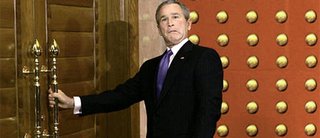Abounding in the ghettos of Europe were the poor, the victims of the loss of the commons through enclosures, those who had suffered from the privatization of the land. In order to deal with the mass unemployment England and other European countries expanded their dominance over the Atlantic in search of new lands to ship thier poor too.
This is the real story of Mayflower, not a glorious history of dissidents looking for a new land, but the export of the poor and criminalized to the new world. North America as penal colony, as we know Australia was used. See my review of the Many Headed Hydra for more on this.
In that same context the Soviet Union and its annexed colonies in Eastern Europeand Communist China played a similar form of buffer for European and Asia-Pacific capitalism.
By creating isolationist economic and political autarchies surplus labour was kept out of the global market. And while these countries produced goods, they imported more than they exported, and they did not export their prison populations.
This was exposed with the unification of Germany. The East German basket case economy nestled next to the Booming West Germany. All that fell apart with unification as East Germany has become one large Free Enterprize Zone, a European Malaquidora in competion with Germany and other EU countries.
And in the Third World, these countries allowed for the booming economies of the G8 by keeping their workers and poor contained in soverign nation states, who imported goods and exported captial. Often as hot money.
Today none of these buffers exist any longer. And the move of the mulititude, as Hardt and Negri call it, the unemployed, the mass of labour now threatens the working class in the advanced industrial countries not as immigrant or emigre labour but through the use of outsourcing. Outsourcing is the harsh discipline of capitalism it plays the same role as unemployment does, and the source of it is the old Soviet Union and other developing countries who are now shipping their poor out around the world looking for work, while importing work into their own nation states.
Here is an interesting take on this;
The Global Labor Threat
By Thomas Palley*
TomPaineSeptember 29, 2005
If the United States were to add two billion low-wage workers, you'd expect that wages would fall across the board, right? Well, there is a famous theorem in international economics - the Stolper-Samuelson theorem - that says when a rich capital-abundant country (such as the United States) trades with a poor labor-abundant country (such as China), wages in the rich country fall and profits go up. The theorem's economic logic is simple. Free trade is tantamount to a massive increase in the rich country's labor supply, since the products made by poor country workers can now be imported. Additionally, demand for workers in the rich country falls as rich country firms abandon labor-intensive production to the poor country. The net result is an effective increase in labor supply and a decrease in labor demand in the rich country, and wages fall.
The relevance of the Stolper-Samuelson theorem is clear. For the last two decades, US policy makers, from both major political parties, have worked assiduously to create a global market place in which goods and capital are free to move. Over the same period, two and a half billion people in China, India, Eastern Europe and the former Soviet Union have discarded economic isolationism and joined the global economy. Now, these two tectonic shifts are coming together in the form of a "super-sized" Stolper-Samuelson effect, and they stand to have depressing consequences for American workers.
Much attention has been devoted to the adverse impacts of the US trade deficit, particularly with China. And the US government has been rightly criticized for failing to apply adequate pressure to get China to remedy its unfair and illegal trading practices. However, no one in Washington is talking about the deeper question of what happens to wages when two billion people from low-wage countries join the global labor market.
Such an event is unprecedented in history. In the past, countries joined the international economy through a slow evolutionary process. Initially, they would export a few goods in which they specialized and had natural competitive advantage. Thereafter, countries would gradually deepen their involvement in international trade. The process was one of gradual integration, and production was largely immobile across countries.
Globalization has changed this by accelerating the process of international integration. It has also made capital, technology and methods of production mobile, marking a watershed with the past. The new order is exemplified by China's recent experiences. In fewer than two decades, China has become a global manufacturing powerhouse through massive foreign direct investment and technology transfer. The impact of this transformation on the US economy is seen in the trade deficit, the loss of manufacturing jobs and downward pressure on wages. Whereas classical free trade connected goods markets across countries, globalization creates a global labor market and moves jobs. Previously trade arbitraged goods prices, now it also arbitrages wages through job shifting.
With the emergence of China, India and Eastern Europe, the dam of Socialism that held back two billion workers has been removed. If two swimming pools are joined, the water level will eventually equalize. That is what is happening with globalization. Manufacturing has already been placed in competition across countries, with dire consequences for manufacturing workers. The internet promises to do the same for previously un-tradable services, and higher-paid knowledge workers will start feeling similar effects. Not since the industrial revolution has there been a transformation of this magnitude, and that revolution took one hundred and fifty years to complete.
Find blog posts, photos, events and more off-site about:
Capitalism, globalization, soviet, union, outsourcing, Russai, China, Europe







